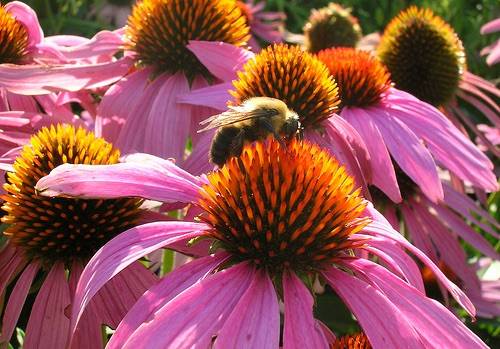By Steve Smith
Unless you have been living under a rock, you should be aware by now of the importance of bees (and insects in general) on our ecosystem. They are our chief pollinators, along with wasps and flies, some moths and butterflies, and even hummingbirds and bats. In the early season, one can observe our native mason bees and bumble bees working over early blooming shrubs, bulbs and perennial and later in the year, the honey bees are the dominate species in the garden. There are several things that home gardeners can do to encourage bees and other insects to come into their yard:
•First and foremost, the more diverse our landscapes are, the greater the odds of luring insects. Bugs are a source of food for birds. Unless you are highly allergic to bee stings, don’t be concerned with a few insects in the garden. Having something in bloom year ‘round is the easiest way to make sure they will visit. Visit the garden center once a month and buy something in bloom to easily accomplish that. It could be a shrub, tree, perennial, or annual – it really doesn’t matter to the bugs.
•If you are running out of room for trees and shrubs, consider “Bee Lawns”, a relatively new craze where you take a grass lawn and convert it into a meadow of multiple species of flowering ground covers – like clover, self-heal and creeping thyme. Depending on the seed mix, you could be mowing your lawn just a few times a year, while drawing in pollinators from around the neighborhood. This is an intriguing concept that our state Department of Agriculture is working on. We should see more information about it later in the year.
•“Insect hotels” are a fad that I observed starting at least 10 years ago while touring in Germany. In many public gardens I saw structures filled with tubes, cones, bark and general yard debris – all arranged in an artful manner and housed in a dollhouse-like structure. Not only were they interesting to look at, they were a magnet for attracting bugs. Fast forward 10 years and now gardeners can purchase smaller versions of these, take them home and simply mount them on an east-facing wall, where the morning sun will warm them up. If you have kids, this is a great way to introduce them to insects.
•Finally, on to Mason bees. They are native, solitary and rarely sting, making them easy for home gardeners to incorporate. You can purchase mason bee cocoons from your local garden center this month and start to get them established in your yard. Adding a mason bee house will make it easier for them to take up residence and before you know it, you will be the “bees knees” for these little guys.
Becoming a “pollinator gardener” can not only be fun, but it can be hugely beneficial and necessary for the pollination of our fruits and veggies. Consider becoming part of the solution to the declining populations of bees.
Steve Smith owns Sunnyside Nursery in Marysville. info@sunnysidenursery.net


